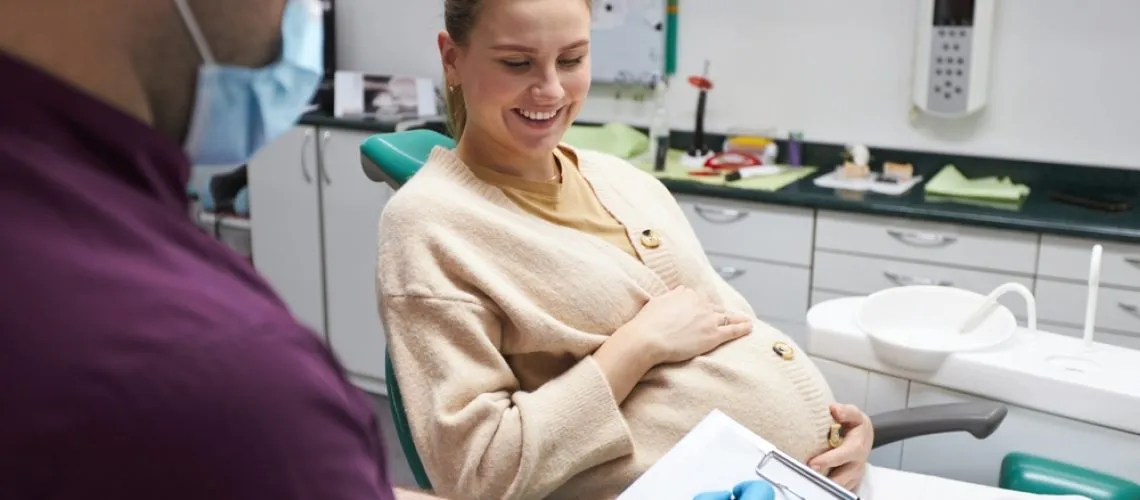Pregnancy brings significant changes to your body, and your oral health is no exception. Fluctuating hormones can impact gum health, making pregnant women more susceptible to conditions like gingivitis and periodontal disease. Additionally, nausea and dietary changes during pregnancy can affect your teeth and gums.
Dr. Maureen Karl, a trusted dentist at St. Clair Dental, PLLC in Granbury, TX, emphasizes that maintaining good oral health during pregnancy is vital for both the mother and the baby. Research shows a potential link between poor oral health and complications such as preterm birth and low birth weight. Understanding how pregnancy affects your oral health is the first step toward ensuring a healthy smile and a safe pregnancy.
Common Dental Issues During Pregnancy
Pregnant women often experience specific dental concerns due to hormonal changes and dietary habits. Understanding these issues can help you take proactive steps to manage them.
Pregnancy Gingivitis
Increased levels of estrogen and progesterone can make gums more sensitive, leading to inflammation and bleeding during brushing. Pregnancy gingivitis affects up to 70% of expectant mothers, but regular dental care can prevent it from progressing to more severe gum disease.
Enamel Erosion
Morning sickness is a common pregnancy symptom, but frequent vomiting can expose teeth to stomach acid, causing enamel erosion. This weakens the protective layer of your teeth, increasing the risk of cavities.
Dry Mouth
Hormonal shifts may lead to reduced saliva production, causing dry mouth. Saliva plays a crucial role in neutralizing acids and washing away bacteria, so a dry mouth can elevate the risk of tooth decay.
Maintaining Oral Health During Pregnancy
Taking care of your teeth and gums during pregnancy is essential for your overall health and the well-being of your baby. Incorporating simple habits into your routine can make a significant difference.
Brush and Floss Regularly
Stick to brushing twice daily with fluoride toothpaste and flossing once daily. Use a soft-bristled toothbrush to minimize gum irritation. If morning sickness makes brushing challenging, rinse your mouth with water or a diluted fluoride mouthwash instead.
Stay Hydrated
Drink plenty of water throughout the day to combat dry mouth and promote saliva production. Opt for fluoridated water when possible, as it strengthens tooth enamel.
Eat Nutrient-Rich Foods
A balanced diet is essential for your oral and overall health. Focus on foods rich in calcium, vitamin D, and phosphorus, such as dairy products, leafy greens, and nuts. These nutrients support strong teeth and bones.
Dental Visits Are More Important Than Ever
Regular dental checkups and cleanings should not be skipped during pregnancy. Dr. Maureen Karl recommends scheduling a visit early in your pregnancy to discuss your oral health needs and establish a care plan.
Dental cleanings can help remove plaque and tartar, reducing the risk of gum disease. Inform your dentist about your pregnancy, as certain procedures or medications may need to be adjusted. Most routine dental care is safe during pregnancy, but the second trimester is often considered the best time for elective treatments.
Safe Dental Treatments During Pregnancy
Some women worry about the safety of dental procedures while pregnant. However, many treatments can be safely performed with proper precautions.
- X-Rays: Dental X-rays are generally safe during pregnancy, especially with modern digital technology. Protective aprons and collars minimize radiation exposure.
- Fillings and Cleanings: These routine treatments are safe and beneficial for maintaining oral health.
- Emergency Procedures: Infections and severe dental pain should not be ignored, as they can pose risks to both the mother and baby.
Your dentist will work with you to ensure all treatments are tailored to your pregnancy needs.
The Role of Hormones in Gum Health
Hormonal changes during pregnancy can significantly impact your gums, making them more vulnerable to plaque and bacteria. This can lead to a condition known as pregnancy gingivitis, which is characterized by redness, swelling, and bleeding gums. Left untreated, gingivitis may progress to periodontal disease, a more severe condition linked to pregnancy complications.
To protect your gum health:
- Brush and floss consistently.
- Use an antimicrobial mouthwash to reduce bacteria.
- Visit your dentist for regular cleanings.
Practical Tips for Managing Morning Sickness and Oral Health
Morning sickness can create unique challenges for oral care. Acid exposure from vomiting can weaken enamel, but taking a few precautions can minimize damage:
- Avoid brushing immediately after vomiting, as the enamel is softened and more susceptible to abrasion. Rinse your mouth with water or a mixture of water and baking soda instead.
- Use a soft-bristled toothbrush and fluoride toothpaste to gently clean your teeth later.
- Chew sugar-free gum or suck on sugar-free lozenges to stimulate saliva production, helping to neutralize acids.
A Healthy Smile for You and Your Baby
Good oral health during pregnancy benefits not only you but also your baby. Studies suggest that untreated gum disease in pregnant women may increase the risk of complications such as preeclampsia and preterm birth. By taking proactive steps to maintain your oral hygiene, you contribute to a healthier pregnancy.
If you’re planning to breastfeed, keeping your teeth and gums healthy is even more crucial. Some bacteria from untreated gum disease can be transferred to your baby during feeding, emphasizing the importance of professional care.
Postpartum Oral Health: What Comes Next
After your baby is born, don’t forget about your oral health. Hormonal changes may continue, and new routines can make it easy to neglect dental care. Schedule a postpartum dental visit to address any lingering issues from pregnancy and discuss strategies for maintaining good oral health as a new mom.
Dr. Maureen Karl and the team at St. Clair Dental, PLLC in Granbury, TX, are committed to supporting you through every stage of your journey. Whether you need guidance during pregnancy or a postpartum checkup, expert care is just a phone call away.
Sources
- Boggess, K. A., & Edelstein, B. L. (2006). Oral Health in Women During Preconception and Pregnancy. Journal of the American Dental Association.
- Wu, M., Chen, S. W., & Jiang, S. Y. (2015). Relationship Between Gingival Inflammation and Pregnancy. Journal of Clinical Periodontology.
- Silk, H., Douglass, A. B., Douglass, J. M., & Silk, L. (2008). Oral Health During Pregnancy. American Family Physician.

